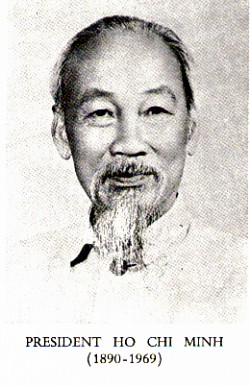
This guy had nothing to do with American defeat in Vietnam; it was those dirty dope-smoking hippies that did us in
This report by Peter Spiegel gives a very good glimpse at how our political and military leadership, chronically and deliberately unprepared for a counterinsurgency war, are now dragging up a failed template from the Vietnam War because they haven't come up with any better way to process the consequences of defeat: Iraq strategy takes page from Vietnam playbook Los Angeles Times 11/24/06.
Spiegel lays out the stab-in-the-back excuse that is all too common among military analysts and the US officer corps:
In historical assessments and the American recollection, Vietnam was the unwinnable war. But to many in the armed forces, Vietnam as a war actually was on its way to succeeding when the Nixon administration and Congress, bowing to public impatience, pulled the plug: first withdrawing U.S. combat forces and then blocking funding and supplies to the South Vietnamese army.
If they hadn't, the South Vietnamese army, which had been bolstered by U.S. advisors and a more focused "hearts and minds" campaign in the later stages of the war, could have been able to fend off the communist North, many leading military thinkers have argued.
In their view, progress was undermined by President Nixon's decision to begin withdrawing U.S. troops in 1969 in the face of political pressure at home, despite military objections that the South Vietnamese army was not ready to go it alone. Another key U.S. mistake, they contend, was the deep cuts Congress made to military aid to Saigon beginning in 1974.
For many in the military, the lessons of Vietnam are clear: Maintain public support, and be patient. (my emphasis)
Bush's seemed to endorse that view and a strategy for the Iraq War arising from it in his stunning comment while he was in Vietnam, "We'll succeed unless we quit."
Spiegel's article gives a good quick survey of various expert comments on the "Vietnamization" strategy. Even if one were to lean toward a glowing assessment of the performance of the ARVN (Army of South Vietnam) - an assessment that reality-based history scarcely supports - there are still some very significant differences between the situation of South Vietnam in 1969 and Iraq today:
In addition, the Iraqi and South Vietnamese militaries are hardly comparable. Although the ARVN was notoriously corrupt and politicized, it was a functioning institution that had been engaged in fighting the communist North for decades. Conversely, the Iraqi army is being built from scratch, and unlike the ARVN, which was clearly aligned with the government in Saigon, Abizaid noted last week that it remained unclear whether the Iraqi government sees their armed forces - rather than armed militia - as their preferred fighters.
The short version of that paragraph could be: it failed with South Vietnam, and Iraq ain't even close to their capabilities to do it.
Near the end of the article, Spiegel restates a critically important point:
"There are certain things you just can't do in a military situation like Iraq or Vietnam, and if you violate these tenets, you're at great risk," Herrington said. "One of them is to take too long to figure out what you ought to be doing so the American public falters in its support."
Such fears, and the consequences of losing political backing for the war in Iraq, have colored military strategy. Senior military officials have acknowledged that maintaining domestic support for the war effort is frequently factored into planning discussions.
That particular brand of Pentagon obsession with public opinion is problematic in so many ways it's mind-boggling. One of those ways is that our military officer corps seems to be losing its willingness and even ability to distinguish professional military considerations from public relations.
And for many of our infallible generals and rightwing politicians, it's going to be part of their excuse for "Who lost Iraq?" It wasn't our flawless generals, oh no. They didn't have anything to do with it. It was those weak-kneed civilians that caved when we had the enemy on their last gasp.
For some perspective, it's worth considering that this coming Sunday, November 26, marks the point at which the United States will have been fighting in Iraq for longer than in the Second World War, which began with the Pearl Harbor attack in December 1941 and ended on V-J Day (Victory in Japan Day) in September 1945. And so far, that gutless civilian public opinion has not resulted in any Congressional limitations on our glorious generals in fighting the war.
And if you believe the civilian officials of the Cheney-Bush administration and the generals serving on the Joint Chiefs of Staff during this war, the generals have received all the troops they have requested and are being given complete freedom to fight the Iraq War in exactly the way they see fit with no civilian interference.
So, for the civilians-stabbed-us-in-the-back theory to be true, that would mean that our Dear Leader Bush and his government and our infallible generals have been bald-faced lying to us all for years! And no patriotic, red-blooded American could possibly think that.
No comments:
Post a Comment